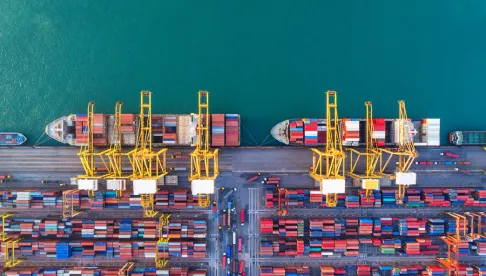Antitrust enforcement remained active in 2017, with the US Department of Justice (DOJ) pursuing both new and long-developed investigations. However, total fines obtained by the DOJ declined sharply from recent years as the automotive parts and foreign exchange investigations wound down. At the end of 2017, and the start of 2018, the European Commission handed down decisions in a number of significant antitrust cartel investigations related to air freight, trucks, maritime carriers and several automotive parts.
US Developments
- In November 2017, an Ohio jury acquitted two Japanese firms, Tokai Kogyo Co. Ltd. and Green Tokai Co. Ltd., of price fixing and bid rigging charges in the market for automotive body seals. This was the DOJ’s first auto parts case to go to trial and a potential bellwether for the attitude that US juries might take toward foreign defendants. The defense focused on evidence of intense price competition for the allegedly rigged components during the conspiracy period.
- In the capacitors investigation, US District Court Judge James Donato of the Northern District of California caught the attention of the industry when he refused to accept the guilty pleas of three companies to horizontal price-fixing. According to the court, these negotiated corporate pleas were not sufficient to penalize the companies and prevent future price fixing agreements. The court called one agreement a “sweetheart deal” and stated that another negotiated plea was merely a “drop in the bucket.” Although the court later accepted open-ended “B” pleas in those cases, the court’s rejection of the traditional fixed-sentence “C” plea agreements may signal less deference to agencies with respect to negotiated plea agreements with companies.
- Over the past few years, the DOJ has exercised greater leniency in sentencing defendants who claim an inability to pay a large fine, hewing to the principle that punishment and deterrence should not put companies out of business. For example, in the packaged seafood investigation, DOJ gave Bumble Bee Foods a $111 million reduction in penalty for inability to pay and cooperation credit. It is likely that the DOJ will continue to evaluate fines in light of companies’ ability to pay them, including companies in smaller industries such as the promotional products cases. However, companies should be aware that judges may not always accept inability-to-pay defenses. Notably, one reason for Judge Donato’s rejection of the capacitor guilty pleas related to his skepticism about one company’s assertion that it was unable to pay a higher fine.
EU Developments
- The European Commission continues its investigation into anticompetitive behavior in the automotive parts sector. Most recently, the Commission imposed fines on manufacturers of occupant safety systems, spark plugs and braking systems, totaling €185 million. In each case, the companies agreed to settle with the Commission, which means that they received a fine reduction in exchange for admitting to the Commission’s objections.
- The Commission imposed a record fine on a truck manufacturer which had decided not to settle with the Commission, contrary to the other participants in the cartel.
- The Commission re-adopted its previous decision to impose fines on air cargo carriers, after its decision had been annulled by the General Court of the EU.
- The European Commission confirmed in July 2017 that German carmakers Volkswagen, Audi, Porsche, BMW and Daimler are “undergoing examination by the Commission.” The companies are believed to have cooperated on how to meet emissions standards for diesel vehicles. Volkswagen and Daimler are believed to have been among the first companies to cooperate with the European Commission. In October 2017, the Commission confirmed that it had carried out inspections at the premises of car manufacturers in Germany.
Active DOJ Cartel Investigations
AUTOMOTIVE PARTS (SUMMARY)
- Products at Issue
- 59 automobile parts at issue
- Type of Conduct
- Bid rigging
- Price fixing
- Market allocation
- Other anticompetitive conduct
- Total companies charged
- 49 companies
- Total companies pled
- 47 companies
- Total companies sentenced
- 47 corporations were convicted and sentenced to pay more than $2.9 billion in criminal fines.
- One corporation and its subsidiary were acquitted by jury, see above regarding Tokai Kogyo Ltd. and Green Tokai Co. Ltd.
- One case (parent and subsidiary) is headed toward trial in 2018, see United States v. Maruyasu Indus. Co., Ltd. No. 1:16-cr-00064-SJD (S.D. Oh.), b. Large Fines
- 47 corporations were convicted and sentenced to pay more than $2.9 billion in criminal fines.
i. US fines up to $425 million for a single company ii. European Commission Fines
1. Four cartels, total fines of €1.6 billion
- Total individuals indicted
- 65 individuals
- Total individuals plead
- 32 individuals
- Total individuals sentenced
- 30 executives have received prison terms ranging from one year and one day to 24 months.
- Of these 30 executives, the sentences break down as follows: Nine executives received prison terms of one year and one day; three for 13 months; five for 14 months; five for 15 months; three for 16 months; two for 18 months; one for 19 months; and two for 24 months.
- Follow-on civil litigation
- In re: Automotive Parts Antitrust Litigation, 2:12-md-02311 (E.D. Mich. 2012).
REAL ESTATE (SUMMARY)
- Over 100 individuals have either pled guilty or have been convicted for bid rigging real estate foreclosure auctions in Alabama, California, Georgia, North Carolina and Florida.
- Prior to an auction on the courthouse steps, the conspirators would agree on a bidding scheme so as to depress the selling price of foreclosed properties.
- Across the country, the conspiracies typically involved separate, mini auctions (sometimes called “rounds”) to award the properties to members of the conspiracy and to determine payoffs for the co-conspirators who had agreed not to bid up the selling price. These “rounds” were often held near the courthouse steps.
ELECTROLYTIC CAPACITORS
- Electrolytic capacitors are components that store and regulate electrical current in electronic products, such as televisions, engines and computers.
- Six Japanese and one Samoan company have pled guilty and have agreed to fines totaling approximately $80 million.
- The grand jury has indicted one company, Nippon Chemi-Con Corporation, which is awaiting trial in October 2018.
- Ten individual executives have been charged, of whom one has pled guilty and been sentenced to a year and a day in prison.
- There is related follow-on civil litigation pending in the United States District Court for the Northern District of California - In Re Capacitors Antitrust Litigation, 14-CV-03264-JD (N.D. Cal. 2014).
PACKAGED SEAFOOD
- These cases relate to an investigation into price fixing of packaged seafood products, including shelf-stable tuna.
- One company, Bumble Bee Foods, LLC, has pled guilty and was ordered to pay a $25 million criminal fine, which could more than triple if Bumble Bee is sold under the terms of the agreement.
- Another firm, Tri Union Seafoods LLC, has acknowledged publicly that it applied for leniency from DOJ in the case.
- Three individuals have pled guilty and are awaiting sentencing in the Northern District of California. Based on the applicable United States Federal Sentencing Guidelines, these individuals could face as much as 30 months imprisonment or more.
- Related follow-on civil litigation is pending in the United States District Court for the Southern District of California. In re Packaged Seafood Products Antitrust Litigation, 3:15-md-02670 (S.D. Cal. 2015).
FOREIGN CURRENCY EXCHANGE
- These cases relate to alleged price fixing and bid-rigging in the foreign currency exchange market.
- DOJ obtained blockbuster guilty pleas in May 2015 from five major banks including Citicorp, JPMorgan Chase & Co. and Barclays PLC. Another bank pled guilty in January 2018. The DOJ has collected more than $2.5 billion in fines to date.
- DOJ has also charged several individual currency dealers with price fixing including two who pled guilty and are awaiting sentencing. These individuals’ plea agreements provide for sentencing reductions in exchange for cooperating with the government.
- There is related follow-on civil litigation pending in the United States District Court for the Southern District of New York – In re Foreign Exchange Benchmark Rates Antitrust Litigation, 1:13-cv-07789 (S.D.N.Y. 2013) [direct purchaser plaintiffs].
GENERIC DRUGS
- On December 15, 2016, attorneys general for 20 states filed a civil suit against six pharmaceutical companies alleging price-fixing agreements over the drugs Doxycycline Hyclate Delayed Release, a tetracycline-class antimicrobial used as adjunctive therapy for severe acne, and Glyburide, an oral diabetes medication used to control blood sugar levels for Type 2 diabetes. Connecticut et al v. Aurobindo Pharma USA, Inc. et al, No. 3:16-cv-02056 (D. Conn.). The suit has been expanded to include 45 states, the District of Columbia, and the Commonwealth of Puerto Rico, and there are now over 30 company-defendants and 18 drugs involved.
- The DOJ has pursued criminal charges against two executives formerly with Heritage Pharmaceuticals, Inc., both of whom have pled guilty to offenses involving doxycycline hyclate and glyburide. The two are awaiting sentencing.
INTERNATIONAL SHIPPING
- These cases relate to roll-on / roll-off ocean shipping of cars, trucks and other vehicles.
- Two Japanese, two Norwegian, and one Chilean carrier have pled guilty and agreed to pay fines totaling over $255 million. One of the carriers, Höegh Autoliners AS, also agreed to serve a three-year term of probation to ensure compliance with the antitrust laws.
- Of note, Korea’s Fair Trade Commission and South Africa’s Competition Commission have imposed substantial fines in this matter totaling 21.6 billion won and 198 million rand, respectively. Australia’s Federal Court ordered NYK Line to pay $25 million AUD, which was Australia’s first criminal charge against a corporation under the criminal cartel provision of its competition law.
- The DOJ has charged at least 11 individuals, including nationals of Germany, Sweden, Japan, and Chile. Of these, four have pled guilty and each has been sentenced to imprisonment of 14 months or more.
- Follow-on civil litigation is F. Ruggiero & Sons, Inc., et al v. NYK Line (North America) Inc. et al, 2:13-cv-03306, District of New Jersey.
LIQUID ALUMINUM SULFATE
- These cases relate to a conspiracy to rig bids and allocate customers in the market for liquid aluminum sulfate, a coagulant used by pulp and paper companies in their manufacturing process and by municipalities in their waste-water treatment process. United States v. Opalewski, et al, No. 16-cr-00065 (D.N.J.).
- DOJ charged three individuals with bid rigging / market division conspiracies that endured from at least 6 years (one defendant), up to 13 years (two defendants).
- In November 2017, DOJ voluntarily dismissed its case against one individual, Vincent J. Opalewski, as no longer in the “interests of justice” to prosecute.
- DOJ also charged one corporation, GEO Specialty Chemicals Inc., which pled guilty and paid a $5 million fine.
PROMOTIONAL PRODUCTS
- These cases relate to alleged price fixing of customized promotional products, such as wristbands and lanyards, sold online. Two companies and their top executives have pled guilty, and the companies have been ordered to pay nearly $2.5 million dollars in criminal fines.
- Of note, DOJ alleged that the defendants communicated using online messaging apps in order to reach and implement their conspiratorial agreements. This will likely be the first of many such cases.
HEIR-LOCATION SERVICES
- Two executives and one company pled guilty to allocating customers and dividing the market for heir-location services sold in the United States. During probate proceedings, companies research unknown claimants to the decedent’s estate and help them to substantiate their claims in exchange for a percentage fee of the claimant’s inheritance. Two companies and two executives agreed with each other to split fees and to not contact the other’s clients.
- The grand jury indicted Kemp & Associates and its Vice President and COO, Daniel J. Mannix. The court made two important holdings prior to trial. First, it held that the rule of reason would apply. The agreement operated to avoid duplicative and potentially wasteful efforts in servicing the same estate and thus had “efficiency-enhancing potential.” Also, per se treatment was inappropriate for an agreement that was “structured in an unusual way” in a “relatively obscure industry.” Second, the court held that the statute of limitations barred prosecution. The challenged agreement ended in July 2008, and only ministerial tasks occurred after that date. United States v. Kemp & Assoc., Inc., No. 16-cr-00403-DS (D. Utah Aug. 28, 2017).
- The government is appealing both rulings to the Tenth Circuit Court of Appeals.
European Cartel Investigations
- On February 21, 2018, the European Commission imposed fines in three separate decisions: maritime car carriers, spark plugs and braking systems. In all three cases, the companies agreed to settle with the Commission and thus benefitted from a 10% fine reduction.
- The Commission imposed fines on four maritime car carriers of €295 million. Among them, the Japanese carrier MOL received full immunity for disclosing the cartel.
- The auto parts investigation is still ongoing in the EU. The Commission fined two suppliers of spark plugs €76 million and two suppliers of braking systems €75 million. In those investigations, Denso and TRW were, respectively, the first companies to come forward.
OCCUPANT SAFETY SYSTEMS
- On November 22, 2017, the Commission rendered another decision in the auto parts investigation. The Commission fined five Japanese car safety equipment suppliers (seatbelts, airbags and steering wheels) €34 million for taking part in four different cartels.
- Takata was the first leniency applicant for three of the cartels and Tokai Rika was the first company to come forward with respect to the fourth cartel.
- The Commission considered that the companies sold price-fixed products to Japanese car manufacturers in the European Economic Area.
TRUCKS
- On September 27, 2017, the Commission fined Scania €880 million for participating in a truck cartel that lasted 14 years.
- The Commission had previously reached a settlement decision with the other participants in the cartel but Scania had refused to settle, which led to separate investigations.
- The Commission claimed that the truck companies colluded on truck pricing and on passing on the costs of new technologies to meet stricter emission rules.
AIR FREIGHT
- On March 17, 2017, the Commission re-adopted its previous decision to fine 11 air cargo carriers, including Air France, KLM, British Airways, Lufthansa and Singapore Airlines.
- The Commission had first rendered a decision in the air freight cartel in 2010 but that decision had been annulled by the General Court of the EU on procedural grounds. The court did not, however, rule on the existence of the cartel itself.
- The Commission adopted a new decision correcting the procedural error but maintained the content of the annulled decision in terms of the price-fixing behavior addressed.






 />i
/>i
